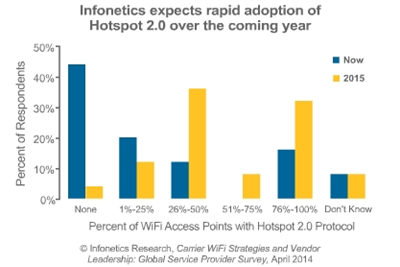 アナリストノート
キャリアのWiFi導入は、モバイル・固定回線のブロードバンド・サービス環境と同様の質の提供に向けて進化しており、WiFiネットワークがより密接に融合されることに繋がっている。
アナリストノート
キャリアのWiFi導入は、モバイル・固定回線のブロードバンド・サービス環境と同様の質の提供に向けて進化しており、WiFiネットワークがより密接に融合されることに繋がっている。Infonetics Researchのモバイル・バックホールおよびスモール・セル担当アナリスト、Richard Webbは、Hotspot 2.0がこうした動きの促進を支援するために通信業界が開発したカギとなるツールであり、調査に協力したキャリアの中でも急速に導入が広まっていると指摘している。
Webbは、オペレーターはキャリアWiFi に賭けているが、同時に今後WiFi事業の採算がとれるようにするためにサービスを収益化させるための方法を開発することにも意欲を見せているとも指摘している。 急速に成長している顧客プランの例として、WiFiローミングやロケーション・ベースのサービスが挙げられる。 キャリアWIFI調査のハイライト
- 回答者は現在、平均3万2,000のアクセスポイントを持っており、2015年までに33%、4万4,000以上にまで増えると予想している。
- Infoneticsのオペレーターの回答者は、Hotspot 2.0が2015年末までにアクセスポイントの半数以上に導入されると見込んでいる。
- 調査対象者が挙げた、WiFiサービス収益化モデルのトップ3はプリペイド、モバイル・ブロードバンドサービス加入との抱き合わせ販売、層別に分けられたホットスポットだった。
- WiFiはオーバーレイネットワークとして、データトラフィックのオフロードのための技術・構造をリードしているが、回答者は,SIMベースのサービスモデル、またはデュアルモードのWiFi/スモールセルの導入により、モバイルRANにWiFiを融合させることに着目しているため、より洗練されたキャリアのWiFiの基本設計が、徐々にこの動きを牽引する傾向にある。
- 回答者はCiscoとRuckus Wirelessを2年連続でキャリアWiFi製造業者のトップと認識していることが分かった。
調査レポートでは、WiFi導入の促進要因やロケーション、アクセスポイント基準やフォームファクター、特徴、範囲、バックホール接続、ホットスポット、モバイルデータ・オフロード、サービス提供モデルと課題、顧客プラン、WiFi機器メーカーの意見に関する見解を提供している。
Vendors named in the survey include Alcatel-Lucent, Aruba Networks, Cisco, Ericsson/BelAir, Guoren, HP, Huawei, Motorola, NSN, Ruckus Wireless, Zhidakang, Xirrus, ZTE, and others. (原文)
Carriers going gangbusters with WiFi and Hotspot 2.0 London, UK, May 1, 2014-Market research firm Infonetics Research released excerpts from its 2014 Carrier WiFi Strategies and Vendor Leadership: Global Service Provider Survey, which explores the drivers, strategies, models, and technology choices that are shaping service provider WiFi deployments. CARRIER WIFI ANALYST NOTE "Carrier WiFi deployments are evolving to deliver the same quality of experience as mobile and fixed-line broadband service environments, and this is driving WiFi networks to become more closely integrated. Hotspot 2.0, a key tool developed by the industry to aid this drive, shows rapid adoption by carriers participating in our latest carrier WiFi survey," notes Richard Webb, directing analyst for mobile backhaul and small cells at Infonetics Research.
Webb adds: "Operators are betting pretty big on carrier WiFi, but they're also keen to develop ways of monetizing services so that WiFi starts to pay for itself over the coming years. WiFi roaming and location-based services are examples of customer plans that are growing fast." CARRIER WIFI SURVEY HIGHLIGHTS
- Respondents have an average of around 32,000 access points currently, growing to just over 44,000 by 2015, representing 33% growth over the next year
- 40% of Infonetics' operator respondents expect to integrate Hotspot 2.0 into more than half their access points by the end of 2015
- Among those surveyed, the top 3 monetization models for WiFi services are pre-pay, bundled with mobile broadband subscription, and tiered hotspots
- WiFi as a separate overlay network currently leads the list of technologies and architectures for offloading data traffic; meanwhile, more sophisticated carrier WiFi architectures gain gradual traction as respondents look to bring WiFi into the mobile RAN via SIM-based service models or by deploying dual-mode WiFi/small cells
- Respondents perceive Cisco and Ruckus Wireless as the top carrier WiFi manufacturers for second consecutive year

